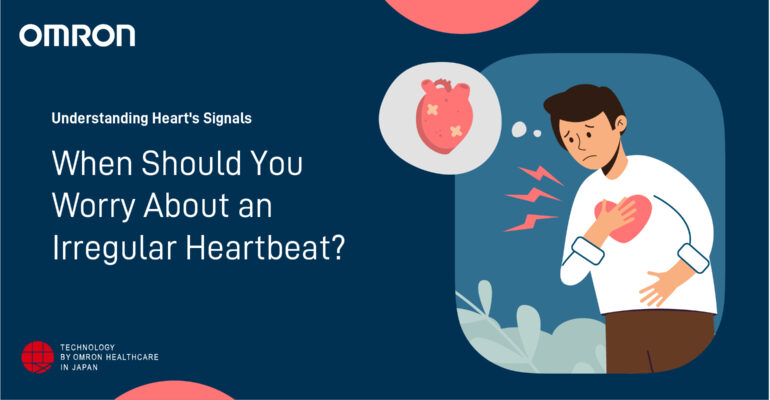When Should You Worry About an Irregular Heartbeat?
August 16, 2023 2024-01-19 12:45When Should You Worry About an Irregular Heartbeat?

When Should You Worry About an Irregular Heartbeat?
Your heart is a muscular organ that pumps blood throughout your body. It beats regularly, delivering blood to your organs and tissues. However, your heart can beat too quickly, too slowly, or irregularly at times. This is known as arrhythmia.
Arrhythmias can be harmless, but they can also be a sign of a serious heart condition. It’s important to see a doctor if you have any symptoms of arrhythmia, so they can properly diagnose the cause and recommend treatment.
What is Arrhythmia?
Arrhythmia refers to any abnormality in the heart’s rhythm, which can be characterized by a heartbeat that is too fast, too slow, or irregular. While it’s common to feel your heart race after exercising or occasionally experience minor irregularities, persistent and severe arrhythmias can be indicators of underlying health issues.
Types of Arrhythmias
- Atrial Fibrillation (AFib): AFib is one of the most common types of arrhythmias. In this condition, the heart’s upper chambers (atria) quiver instead of contracting efficiently, leading to an irregular and often rapid heartbeat. AFib increases the risk of stroke, heart failure, and other heart-related complications.
- Bradycardia: This is when the heart beats too slowly, usually under 60 beats per minute. While athletes and individuals who are very fit might have a naturally low heart rate, bradycardia can also be caused by issues with the heart’s electrical system.
- Tachycardia: The opposite of bradycardia, tachycardia occurs when the heart beats too fast, typically over 100 beats per minute. It can be a result of various factors, including stress, fever, anemia, or underlying heart conditions.
- Premature Contractions: These are early heartbeats that can feel like fluttering or pounding in the chest. While they’re often harmless, they can sometimes indicate an increased risk of more severe arrhythmias.
- Ventricular Fibrillation: This is a life-threatening arrhythmia where the heart’s lower chambers (ventricles) quiver erratically, preventing blood from being pumped effectively. Immediate medical attention is required to prevent cardiac arrest and death.
Causes of Arrhythmias
Arrhythmias can stem from a various of factors, including:
- Heart Conditions: Existing heart problems, such as coronary artery disease, heart valve issues, or heart muscle damage, can increase the risk of arrhythmias.
- High Blood Pressure: Uncontrolled hypertension strains the heart, leading to abnormal rhythms.
- Electrolyte Imbalance: An imbalance in essential minerals like potassium, sodium, calcium, and magnesium can disrupt the heart’s electrical signals.
- Stress: Chronic stress can impact the heart’s rhythm over time.
- Substance Abuse: Excessive alcohol or stimulant use can trigger arrhythmias.
- Genetics: Some arrhythmias have a genetic component, running in families.
- Other Health Conditions: Conditions like thyroid problems, diabetes, and sleep apnea can contribute to irregular heartbeats.
When to Worry?
Not all irregular heartbeats are cause for immediate concern. It’s essential to differentiate between harmless arrhythmias and those that require medical attention. Here’s when you should worry:
- Persistent Symptoms: If you experience recurrent palpitations, chest pain, shortness of breath, dizziness, or fainting, it’s crucial to seek medical advice.
- Sudden Onset: If you suddenly experience a racing heart, severe palpitations, or dizziness without any apparent trigger, it could be a sign of a dangerous arrhythmia.
- Underlying Health Conditions: If you have a history of heart disease, high blood pressure, or other chronic conditions, any change in your heart’s rhythm should be evaluated.
- Syncope: Fainting or nearly fainting can indicate a lack of proper blood flow due to arrhythmia.
- Physical Discomfort: If your irregular heartbeat is accompanied by pain, pressure, or discomfort in the chest, neck, jaw, or arms, seek immediate medical attention, as these could be signs of a heart attack.
Wrap-Up
An irregular heartbeat can range from a harmless flutter to a life-threatening emergency. It’s important to recognize when to worry about your heart’s rhythm and seek medical attention promptly.
Reference:
- https://www.nhlbi.nih.gov/health/arrhythmias
- https://my.clevelandclinic.org/health/diseases/16765-atrial-fibrillation-afib#:~:text=Atrial%20fibrillation%20(Afib)%20is%20an,artery%20disease%20and%20having%20obesity.
- https://www.mayoclinic.org/diseases-conditions/atrial-fibrillation/symptoms-causes/syc-20350624#:~:text=An%20irregular%20heart%20rhythm%20is,and%20other%20heart%2Drelated%20complications.
- https://www.mayoclinic.org/diseases-conditions/bradycardia/symptoms-causes/syc-20355474
- https://www.mayoclinic.org/diseases-conditions/tachycardia/symptoms-causes/syc-20355127#:~:text=Tachycardia%20(tak%2Dih%2DKAHR,as%20a%20response%20to%20stress.
- https://www.webmd.com/heart-disease/premature-ventricular-contractions-facts#:~:text=If%20your%20heart%20feels%20out,or%20an%20irregular%20heart%20rhythm.&text=PVCs%20aren’t%20a%20reason,if%20you’re%20healthy%20otherwise.
- https://www.mayoclinic.org/diseases-conditions/ventricular-fibrillation/symptoms-causes/syc-20364523
- https://www.mayoclinic.org/diseases-conditions/ventricular-fibrillation/symptoms-causes/syc-20364523
- https://my.clevelandclinic.org/health/diseases/16749-arrhythmia






